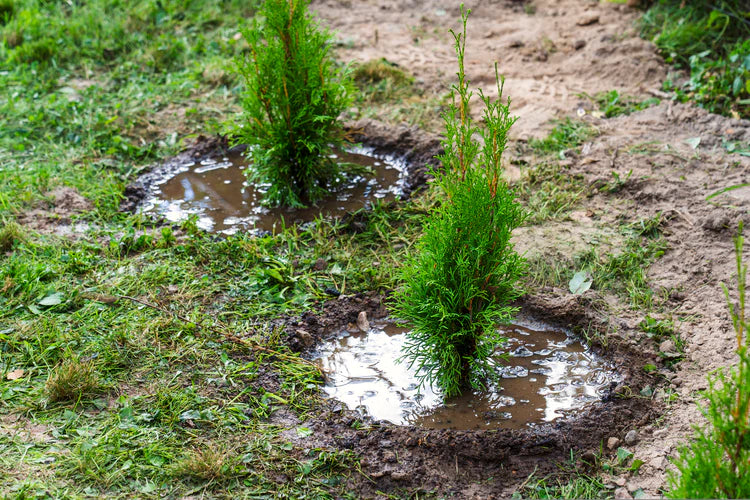If you are looking for a natural way to create privacy around your home, privacy trees are an excellent option. They not only provide a natural barrier between your property and the outside world but can also be used to create a beautiful landscape. However, choosing the right privacy tree for your yard can be challenging. In this blog post, we will explore the top ten privacy trees, focusing on growth rates and how they can provide the privacy you need.
- Leyland Cypress (Cupressus × leylandii) Leyland cypress is a popular choice for privacy trees due to its fast growth rate, dense foliage, and easy-to-prune shape. These trees can grow up to 3-4 feet per year, making them an excellent option for quickly creating a privacy screen. Leyland cypress trees also provide a good windbreak and can grow up to 60-70 feet tall, making them ideal for larger properties.
However, leyland cypress trees are susceptible to bagworms and spider mites, which can cause damage to the tree's foliage. Additionally, these trees have a shallow root system and are not drought-tolerant, which means they require regular watering to stay healthy.
- Eastern Red Cedar (Juniperus virginiana) Eastern red cedar is a slow-growing tree that can grow up to 1-2 feet per year. While it may not be the fastest-growing privacy tree on this list, it makes up for it with its drought tolerance, evergreen foliage, and resistance to pests and diseases. Eastern red cedar trees can also provide a good windbreak and produce attractive blue berries.
However, eastern red cedar trees may become invasive, and their foliage can suffer from cedar apple rust disease. It's also essential to note that these trees have a strong odor, which some people may find unpleasant.
- American Holly (Ilex opaca) American holly is a slow-growing tree that can grow up to 6-12 inches per year. While it may take longer to reach its full height, American holly trees provide dense foliage, attractive red berries, and are resistant to pests and diseases. These trees are also drought-tolerant and can grow up to 50-60 feet tall, making them an excellent option for larger properties.
However, American holly trees require acidic soil to thrive, and their slow growth rate may not make them the best option for those looking to quickly establish a privacy screen. Additionally, these trees may suffer from leaf spot disease.
- Emerald Arborvitae (Thuja occidentalis ‘Smaragd’) Emerald arborvitae is a fast-growing tree that can grow up to 1-2 feet per year. These trees provide dense foliage, an evergreen appearance, and are easy to prune and shape, making them an excellent option for creating a privacy screen. Emerald arborvitae trees can also provide a good windbreak and grow up to 15-20 feet tall.
However, these trees are susceptible to spider mites and may suffer from winter burn. Additionally, they are not drought-tolerant, which means they require regular watering to stay healthy.
- Green Giant Arborvitae (Thuja standishii × plicata) Green giant arborvitae is another fast-growing tree that can grow up to 3-5 feet per year. These trees provide dense foliage, an evergreen appearance, and are resistant to pests and diseases. Green giant arborvitae trees can also grow up to 60-70 feet tall, making them an excellent option for larger properties.
However, these trees are also susceptible to spider mites and may suffer from winter burn. Additionally, they are not drought-tolerant, which means they require regular watering to stay healthy.
- Cryptomeria (Cryptomeria japonica) Cryptomeria is a fast-growing evergreen tree that can grow up to 1-2 feet per year. These trees provide attractive foliage, are drought-tolerant, and can grow up to 50-70 feet tall, making them an excellent option for creating a tall privacy screen. Cryptomeria trees can also provide a good windbreak and are resistant to pests and diseases.
However, these trees are susceptible to spider mites and may suffer from scale insects. Additionally, they are not tolerant of salt spray, which can be a problem for those living near the ocean.
- Norway Spruce (Picea abies) Norway spruce is a fast-growing evergreen tree that can grow up to 1-2 feet per year. These trees provide an attractive appearance, a good windbreak, and are resistant to pests and diseases. Norway spruce trees can also produce attractive cones and grow up to 80-100 feet tall, making them an excellent option for creating a tall privacy screen.
However, these trees are not drought-tolerant and may suffer from spider mites and spruce gall aphids. Additionally, they have a shallow root system, which can make them susceptible to wind damage.
- White Pine (Pinus strobus) White pine is a fast-growing evergreen tree that can grow up to 2-3 feet per year. These trees provide an attractive appearance, a good windbreak, and are resistant to pests and diseases. White pine trees can also produce attractive needles and grow up to 80-100 feet tall, making them an excellent option for creating a tall privacy screen.
However, these trees are not drought-tolerant and may suffer from white pine weevil and pine tip moth. Additionally, they have a shallow root system, which can make them susceptible to wind damage.
- Eastern White Cedar (Thuja occidentalis) Eastern white cedar is a slow-growing evergreen tree that can grow up to 1-2 feet per year. These trees provide an attractive appearance, are drought-tolerant, and can grow up to 40-50 feet tall, making them an excellent option for creating a shorter privacy screen. Eastern white cedar trees can also provide a good windbreak and produce attractive cones.
However, these trees are susceptible to cedar apple rust disease and may suffer from spider mites. Additionally, their slow growth rate may not make them the best option for those looking to quickly establish a privacy screen.
- Bald Cypress (Taxodium distichum) Bald cypress is a slow-growing deciduous tree that can grow up to 1-2 feet per year. While it may not be an evergreen, bald cypress provides an attractive appearance, good windbreak, and produces attractive fall color. These trees are also drought-tolerant and can grow up to 50-70 feet tall, making them an excellent option for creating a privacy screen.
However, these trees are susceptible to cypress bark beetle and spider mites, and they require wet soil to thrive. Additionally, their slow growth rate may not make them the best option for those looking to quickly establish a privacy screen.
Choosing the Right Privacy Tree for Your Property When choosing a privacy tree for your property, it's important to consider the growth rate, as well as other factors such as soil conditions, climate, and space. If you are looking to quickly establish a privacy screen, fast-growing trees such as leyland cypress or green giant arborvitae may be the best option. However, if you have more time and are looking for a longer-term solution, slow-growing trees such as eastern white cedar or American holly may be the better option.
Additionally, it's important to consider the pros and cons of each tree. For example, while bald cypress may provide attractive fall color, it may not be the best option for those living in dry climates, as it requires wet soil to thrive. Similarly, while eastern red cedar is drought-tolerant and resistant to pests and diseases, it may become invasive and have a strong odor that some people may find unpleasant.
It's also important to consider the space you have available. Some privacy trees, such as Norway spruce or white pine, can grow up to 80-100 feet tall, which may not be suitable for smaller properties. In contrast, eastern white cedar or American holly may be a better option for those looking to create a shorter privacy screen.
In addition to choosing the right privacy tree, it's important to properly care for and maintain your trees. Regular watering, pruning, and fertilizing can help your trees grow and thrive, providing the privacy and beauty you desire.
Conclusion Privacy trees can be an excellent way to create a natural barrier around your property. While the growth rate is an important factor to consider, it's also essential to consider the pros and cons of each tree, as well as other factors such as soil conditions and space. By carefully selecting and caring for your privacy trees, you can create a beautiful and natural privacy screen that will provide you with privacy and enjoyment for years to come.
|
Tree Name |
Growth Rate |
Pros |
Cons |
|
Leyland Cypress |
3-4 ft/year |
Fast-growing, dense foliage, easy to prune |
Susceptible to bagworms and spider mites, shallow root system, not drought-tolerant |
|
Eastern Red Cedar |
1-2 ft/year |
Drought-tolerant, evergreen, resistant to pests and diseases |
Slow-growing, may become invasive, may suffer from cedar apple rust disease |
|
American Holly |
6-12 in/year |
Attractive red berries, evergreen, dense foliage, drought-tolerant, resistant to pests and diseases |
Slow-growing, requires acidic soil, may suffer from leaf spot disease |
|
Emerald Arborvitae |
1-2 ft/year |
Fast-growing, dense foliage, evergreen, easy to prune and shape |
Susceptible to spider mites, not drought-tolerant, may suffer from winter burn |
|
Green Giant Arborvitae |
3-5 ft/year |
Fast-growing, dense foliage, evergreen, resistant to pests and diseases |
Susceptible to spider mites, not drought-tolerant, may suffer from winter burn |
|
Cryptomeria |
1-2 ft/year |
Fast-growing, evergreen, attractive foliage, drought-tolerant |
Susceptible to spider mites, may suffer from scale insects, not tolerant of salt spray |
|
Norway Spruce |
1-2 ft/year |
Fast-growing, evergreen, good windbreak, resistant to pests and diseases, attractive cones |
Not drought-tolerant, may suffer from spider mites and spruce gall aphids, shallow root system |
|
White Pine |
2-3 ft/year |
Fast-growing, evergreen, good windbreak, attractive needles, resistant to pests and diseases |
Not drought-tolerant, may suffer from white pine weevil and pine tip moth, shallow root system |
|
Eastern White Cedar |
1-2 ft/year |
Evergreen, drought-tolerant, good windbreak, attractive cones |
Slow-growing, susceptible to cedar apple rust disease, may suffer from spider mites |
|
Bald Cypress |
1-2 ft/year |
Deciduous, drought-tolerant, attractive fall color, good windbreak |
Slow-growing, not evergreen, may suffer from cypress bark beetle and spider mites, requires wet soil |

